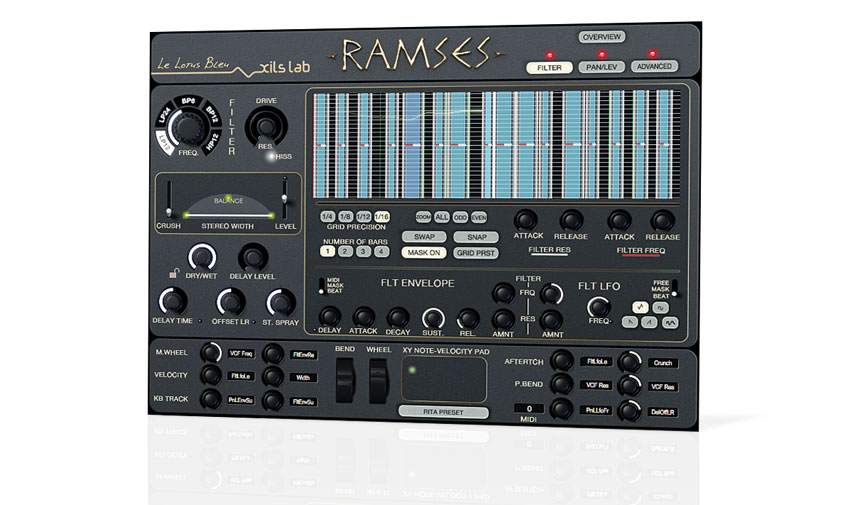MusicRadar Verdict
Despite being great at what it does, and bang on the money sonically, RAMSES just doesn't get our pulses racing as much as we'd hoped it would.
Pros
- +
Masks for custom grooves. RITA is great. Powerful stereo effect. Easy to use. Superb sound.
Cons
- -
Not particularly versatile.
MusicRadar's got your back
XILS-lab is known primarily for its range of excellent soft synths, but in the last couple of years it's moved into the area of effects too. The latest of these is RAMSES, which is an acronym standing for "Rhythm And Motion Stereo Engine System".
"RAMSES is an acronym standing for 'Rhythm And Motion Stereo Engine System'"
At its core, RAMSES (VST/AU/RTAS/AAX) comprises a multimode filter, a stereo control section, a volume/bitcrusher module and a delay, which should immediately give a good indication of the kinds of effects its designed to generate. However, it's the way these units are controlled that gives RAMSES its purpose.
The first level of modulation comes from the LFO and envelope controls, but that's really only the beginning. These modulators can be further controlled or triggered by Masks (see below) or MIDI, and it's the Masks that bring the "Rhythm And Motion".
XILS' Masks concept was first realised in their Le Masque: Delay and Oxium plugins. Masks are basically step sequencers for control parameters (attack, volume, pan, etc), but unlike the steps in a regular sequencer, they enable you to place the start and end points freely, either snapped to a tempo grid or not. They can also each be applied to two parameters simultaneously, with as many or few steps as you like, and it all comes together to enable total control over the groove and timing.
RAMSES has three Masks for creating sequences up to four bars long, the first modulating the filter, the second controlling pan/level, and the third, called Advanced Mask, freely assignable to a range of parameters. Sequences can also be copied and pasted between Masks, and the Overview mode shows all three on screen at once for easy visualisation of their timing.
Walk like an Egyptian
Essentially, RAMSES is all about syncopated gating, panning and filtering, with delay thrown in for good measure, making it well suited to glitching, special effects, wah-wah textures and so forth.
"The processing modules themselves sound great, as we would expect from XILS-lab"
The processing modules themselves sound great, as we would expect from XILS-lab - the overall colouration is warm and ear-pleasing (unless the bitcrusher is deployed, of course!), and the self-oscillating filter is absolutely beautiful.
Want all the hottest music and gear news, reviews, deals, features and more, direct to your inbox? Sign up here.
And being a true stereo plugin (treating left and right signals independently), intense stereo effects can even be wrought out of mono signals, particularly with the so-called Spray Delay. While not quite as exciting as the marketing would have you believe, this can generate conventional delays or, by offsetting the left and right signals and modulating them, dynamic stereo effects.
There's a lot more detail to RAMSES that we don't have space to cover, but despite offering a fine level of control, the learning curve is pretty shallow - within an hour or so you should feel confident creating fresh patches and tweaking the library presets.
After trying each and every preset, though, we wondered why the programmers didn't do more with them to showcase RAMSES' versatility. Then we spent some time programming a few of our own and it turns out that the plugin is actually quite limited in its output.
Put simply, if rhythmic filtering, gating and panning effects aren't part of your sound, you can pass this one by. If such manoeuvres are your bag, though, RAMSES would make a solid albeit rather one-dimensional addition to your plugins folder.
Computer Music magazine is the world’s best selling publication dedicated solely to making great music with your Mac or PC computer. Each issue it brings its lucky readers the best in cutting-edge tutorials, need-to-know, expert software reviews and even all the tools you actually need to make great music today, courtesy of our legendary CM Plugin Suite.

